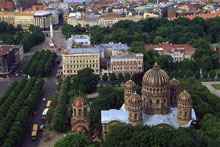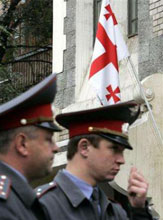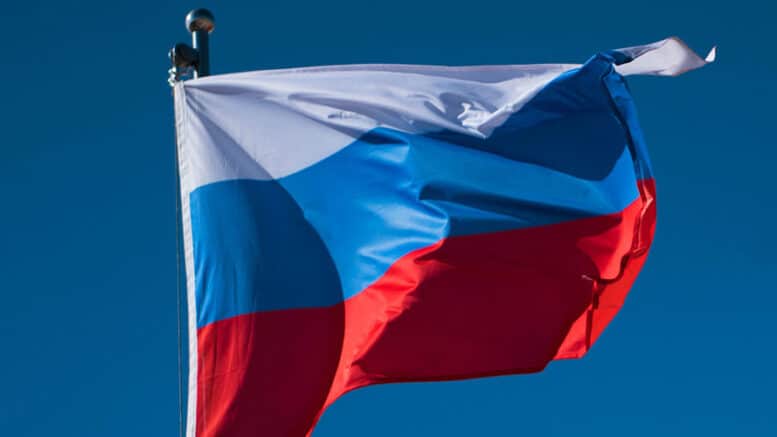During the last few weeks, the term “russkiy mir,” which can roughly be translated as “Russian world,” suddenly gained increasing prominence. It became the center of numerous initiatives and contentious debates. Although the term has been previously known but not widely used, it was ushered into the public sphere by President Vladimir Putin in his State of the Union speech at the end of April: “The Russian language not only preserves an entire layer of truly global achievements but is also the living space for the many millions of people in the Russian-speaking world, a community that goes far beyond Russia itself. As the common heritage of many peoples, the Russian language will never become the language of hatred or enmity, xenophobia or isolationism.”

However, Russians abroad continue to complain about the lack of opportunities for the development of Russian language, especially in the former Soviet republics, where it previously functioned as a lingua franca.
“We don’t forget Russian, but we use it in a less and less sophisticated way,” said Darya Zhdanova, 30, a Latvian citizen of Russian descent. “We use it for informal communication between family and friends, but the Latvian government limits Russian broadcasts on television to only a few minutes a day and prohibits the use of Russian in government offices. It’s no wonder that people are losing their language skills.”
The situation in Latvia’s capital, Riga, which lacks street signs in Russian despite having a Russian-speaking majority of the population, is typical of post-Soviet countries. When the former Soviet republics became independent, the leaders of the new governments began to view the widespread use of Russian as a hindrance to the development of local languages and national identities.

“English is very popular all over the world and its power is based on the achievements of the Anglo-Saxon civilization,” said Vitaly Kostomarov, president of the State Institute of Russian Language in Moscow. “But introducing it as the main language of interethnic communication in the former Soviet Union will require a lot of time and effort. There is no need to speed up this process artificially by squeezing Russian out. It is far from a dying language, despite the fact that it ceded some ground during the 1990s.”
Most Russian intellectuals and language experts suggest that viewing Russian and English as competitors or even viewing Russian as being in competition with national languages in the former Soviet republics is inappropriate.
“No language is an enemy to another language,” said Roy Medvedev, a noted Russian historian and himself a native of Tbilisi, Georgia. “In London I met a family of a well-to-do Kazakh businessman who represents a rich Kazakh company in Britain. His family members speak Russian among themselves, but they speak English with his business partners and switch to Kazakh when they visit their home country. This fluency in languages is one of the sources of their success.”
The government of Kazakhstan encourages the teaching of Kazakh, English, and Russian, and the success of this plan so far makes Kazakhstan unique among the post-Soviet states.

In Belarus and Kyrgyzstan, Russian is also a state language – a situation that offers significant benefits to the young people in these countries. Learning Russian gives them greater access to information and the media, including the Internet, and also makes it possible to attend Russian universities. Russia has an equal-access agreement with Belarus, Kazakhstan, Tajikistan and Kyrgyzstan, which allows qualified students from these countries to study in Russian state universities. Additionally, Russian remains the language of learning in most of the universities in the post-Soviet states – partially because most of the available textbooks are in Russian.
Often the greater opportunities available for students who speak Russian seem to contradict the desires of post-Soviet governments that are attempting to promote national languages.
“In our country, we have 80 ethnic groups for whom Russian has always been the language of interethnic communication,” said Nailya Khaliluyeva, a teacher of Russian from Kyrgyzstan. “In the south of the country, all official documents are made only in Kyrgyz, but in the capital of Bishkek we are still allowed to use Russian. Parents want their children to attend schools that teach in Russian rather than Kyrgyz.”
Although Georgian and Ukrainian are not more widely spoken internationally than Kyrgyz and Belarussian, these countries have made a much more committed effort to replace Russian with their national languages, particularly in educated circles. Additionally, Georgia and Ukraine do not coordinate their educational policies with any of the other CIS countries, further isolating their students from Russian.
In Roy Medvedev’s opinion, these decisions are not damaging to Russia, but are instead harmful for Georgia and Ukraine.

Kostomarov cautions, however, that the survival and spread of Russian cannot be guaranteed by Russia’s past glories. Instead, it will depend on the country’s economic performance and its global image.
“Using Marxist terms, language is not the base but only an extension of a nation’s development in general,” Kostomarov said. “Now that the Russian economy is growing, the language has also shown some indications of recovery, albeit a limited one, because the national image has not yet improved significantly.”
The other important factor, in Kostomarov’s opinion, is the support that the Russian state provides for the study of the language abroad. Until 1989, Russian was a required subject for almost all students in the Socialist bloc. Since then, however, the number of students studying Russian has fallen dramatically and language courses are often supported by Russian embassies, providing textbooks and sponsoring conferences for students and teachers. Along with local authorities, the Russian government also helps finance “Slavic universities” in many of the post-Soviet republics that offer education in Russian. Graduates of these universities receive diplomas valid both in Russia and their country of origin.
According to the International Association of Teachers of Russian Language and Literature, the number of people studying Russian worldwide is comparable to the number of people studying French or German. Along with Spanish and English, it remains one of the main languages of international scientific communication. While numbering fewer speakers than English, Chinese, Spanish or Hindu, Russian is still spoken by more people than French (about 130 million) and German (about 100 million).
According to the figures cited in a speech by Medvedev at the conference on Russian language abroad on May 29, Russian is understood and used to some extent by 274 million people. Out of this number, 130 million are Russian citizens living in Russia and 30 million are Russians living abroad. The remaining 114 million are people who speak Russian as their second language or know it as a foreign language. This is a priceless heritage that needs to be sustained and developed.
This piece, on the current status of Russian around the world, was originally printed on the Russia Profile site. It is reprinted here with permission.


